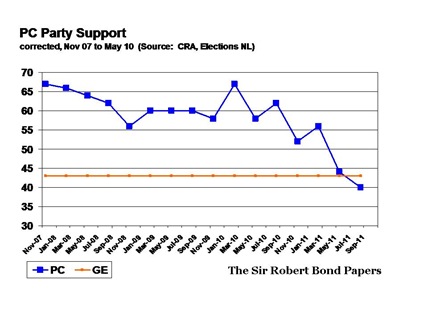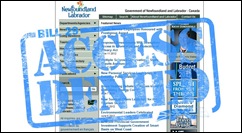There's letters seal'd, and my two schoolfellows,
Whom I will trust as I will adders fang'd—
They bear the mandate, they must sweep my way
And marshal me to knavery. Let it work;
For 'tis the sport to have the enginer
Hoist with his own petard, an't shall go hard
But I will delve one yard below their mines
And blow them at the moon.
For the past seven years the Tory political staffers masquerading online as a variety of real people have liked to push the theme that the New Democrats should form the official opposition in preference to the Liberals.
Danny Williams , you may recall who that is, used to compliment Lorraine Michael on her performance and her questions in a way that was by no means smarmy, condescending and appearing to be insincere.
He and his friends slagged Liberals – especially Yvonne Jones – at the drop of a hat.
The Tories even agreed among themselves, backed by the supposedly impartial Speaker of the House of Assembly, to give extra cash to the NDP caucus and to deny the Liberals of funds recommended by an independent commission.
They did this in the mistaken belief that fostering a fight between the opposition parties would allow their beloved benefactors [and party] to stay in power.
If the trends in this election hold true, their clever little political plot has already come back to roger them in ways they did not see coming.
And they richly deserve both the shock and the shaft.
“Hoist with his own petard” are the words Shakespeare wrote for Hamlet. A petard is another word for a bomb intended.
A few centuries later own goal is a word you’ll still hear military engineers talk about them. Except this time they call them “own goals.”
You’ll find own goals in other places too, like when any crafty plan backfires.
Own goals are the way the universe reacts to over-weaning and undeserved arrogance.
Own goals are Fate’s reward for douchebags.
The New Democrats are giving the Conservatives a hard run in their supposedly safe homes in St. John’s.
Tom Osborne, of the Osborne-Ridgley dynasty, is fighting hard against a sharp young New Democrat named Keith Dunne in St. John’s South. He is a former health minister.
Ed Buckingham has represented the uber-Tory seat of St. John’s East. He replaced John Ottenheimer as the representative for a seat that has previously sent such ardent Townie Tories as Witch0hunt Willie Marshall in to battle with the evil Liberals. Buckingham’s got a fight on his hands from gasoline guru George Murphy.
Over in St. John’s North, Bob Ridgley is having a hard time just like his nephew in St. John’s South. Among other things, Ridgley is apparently facing the ire of public sector pensioners whom the Tories poked needlessly in the eye early on in the campaign. Bob’s under pressure from New Democrat party president Dale Kirby.
And in St. John’s Centre, New Democrat Gerry Rogers is threatening to cut short the political career of natural resources minister Shawn Skinner. That struggle contains the stuff of Greek theatre, bringing together, as it would appear, the breast cancer scandal - the second biggest political controversy since 2003 – with the Conservatives’ entry in the campaign to supplant the 1969 Churchill Falls contract as the public reference point for political disaster.
Since the late 1990s, the Tories have used their old guaranteed seats in St. John’s as the base from which to stage their comeback. They’ve had an unassailable lock on the seats in the metro area since 2003. The Tories evidently figured this time would be the same.
But something happened that no one seems to have expected.
Sure the polls showed a marked drop in Tory support starting in early 2010. The former Tory enthusiasts just seemed to disappear off the political polling landscape.

Where they went didn’t show up until later on. New Democrat support didn’t really pick up until May 2010. What appeared to be a temporary bump from the federal election turned out to be something more.
What the provincial Conservatives missed along the way is that in the St. John’s area their supporters bleed to the New Democrats. So anything that builds the New Democrats weakens the Tories, not the Grits.
If the Tories imagined the NDP could not organize its way to anything beyond what they had already, then the Tories figured wrongly.
As the Tories talked up the need to keep a member on the government side, they seem to have forgotten that in St. John’s, the old patronage lines don’t work. They don’t work because they don’t matter.
Townie members of the House of Assembly don’t deliver pork to their constituents. They have precious little to do with the majority of their constituents whose needs for fire trucks and road paving come from municipal government rather than their provincial politician.
Townie voters can elect an opposition member to the legislature and not feel a single pang of retribution.
Townie voters are also public servants in large numbers. Tom Marshall’s dismissal of retired public servants in the talk of giving them a modest raise in benefits may well have resonated with the majority of public servants who are getting ever closer to retirement age.
When the Tory platform promises included a set of crossed fingers – we’ll deliver the promises of more cash only if we don’t need to cut spending – that likely sent a second uncomfortable chill up the spines of civil servants everywhere.
Safe to vote for an opposition politician and given plenty of reasons to do so.
Sweet, eh?
Regardless of what happens on Tuesday, regardless of how many seats the New Democrat win and regardless of whether they form the opposition or not, this election marks a shift in provincial politics.
The Tories got a big scare.
The New Democrats got a big boost.
What happens next is what matters.
At age 68, New Democrat leader Lorraine Michael is likely to step down before 2015. The party’s new energy will drive more interest in the job and the party than usual. They will get lots of media coverage and the chance to showcase their new energy for the entire province.
The new leader and the New Democrats already have genuine new energy. They will stand in stark contrast to the Conservatives.
The Tories will face a leadership fight delayed from Williams’ departure. Kathy Dunderdale was only supposed to stay for a while. Now she plans to stick around for two terms. The oldest person ever elected Premier plans to hang on until she is the second oldest person to retire from the job.
That may cause tension within the caucus, especially if there are other potential leaders who put their ambitions aside for what they thought was a short time.
Political pressures coming out of the election or internal divisions from tough governing choices could add other tensions.
The party platform is already starved of new ideas. It is in autopilot.
And then there are the other Tories who planned to retire but who hung on for the good of the party through one more election. They will go sooner rather than later.
And so the Tories will face by-elections.
Those by-elections will not be as easy as they used to be.
Political parties in Newfoundland and Labrador aren’t good at refreshing themselves while they are in power. Then tend to coast rather than move off in a genuinely new direction that aligns with voter moods.
The inevitable result is that they get tossed.
The only reason political parties last as long as they do – 17 years for the Tories the first time, 14 years for the Liberals the second time – is that the other guys never get their act together.
That might be changing.
Whom they gods would destroy, they first make proud.
- srbp -

